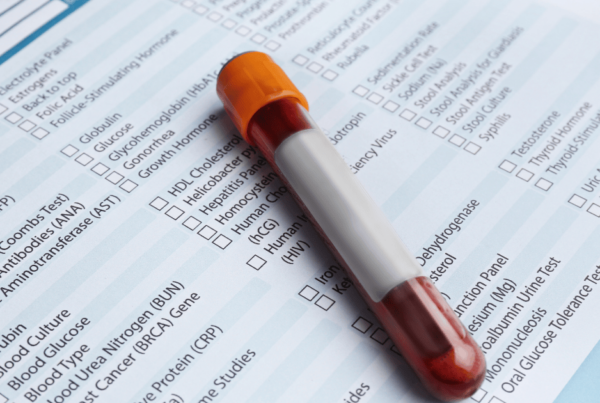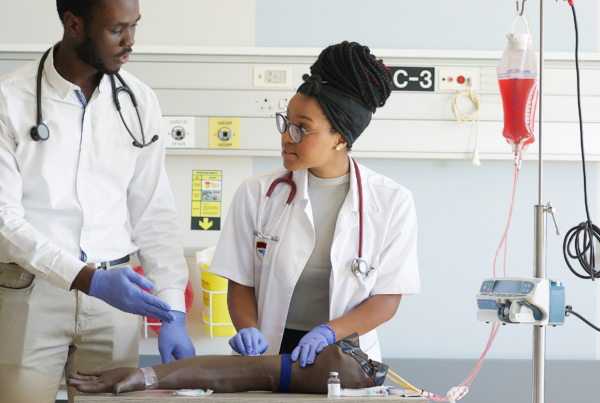Thinking about a career in healthcare but overwhelmed by the options? Look no further than phlebotomy! This dynamic field offers a unique blend of practical skills, patient interaction, and a fast-paced environment. In this comprehensive guide by Phlebotomy Now School, we’ll answer the question “How do I become a phlebotomist?” and explore the exciting possibilities this career path holds.
How Do I Become a Phlebotomist? A Step-by-Step Guide
| Key Takeaways About Phlebotomy Careers |
| Phlebotomy is a rewarding healthcare career that allows you to play a vital role in patient diagnosis and treatment. |
| It typically takes less than a year to become a certified phlebotomist through an accredited program. |
| Phlebotomists work in various healthcare settings, offering a diverse work environment. |
| The job outlook for phlebotomists is promising, with a high demand for skilled professionals. |
| Success as a phlebotomist requires a blend of technical skills, soft skills, and a passion for helping others. |
What Exactly Does a Phlebotomist Do?
Phlebotomists, also known as phlebotomy technicians, are healthcare professionals trained to collect blood samples from patients. Their duties go beyond just drawing blood. Phlebotomists are essential to the diagnosis procedure because they:
- Preparing blood samples for testing
- Collecting patient medical information
- Assisting with blood transfusions
- Supporting patients who may be apprehensive about needles
One Day in the Life of a Phlebotomist
Your typical workday as a phlebotomist can involve a variety of tasks:
- Communicating with patients to explain the blood draw procedure and answer any questions they may have.
- Checking vital signs like temperature and blood pressure.
- Labeling vials accurately to ensure proper sample identification.
- Maintaining a sterile work environment to prevent infections.
- Collecting blood samples using various techniques, including venipuncture (from a vein) and capillary puncture (from a fingertip).
- Updating patient medical records with relevant information about the blood draw.
Where Do Phlebotomists Work? The Diverse Work Settings for Phlebotomists
The beauty of a phlebotomist career lies in its versatility. You can find phlebotomists working in various healthcare settings, including:
- Hospitals
- Medical laboratories
- Clinics
- Nursing homes
- Blood donation centers
- Outpatient care centers
- Research facilities
- Community health centers
- Insurance companies
The Future of Phlebotomy: Job Outlook and Salary
The job outlook for phlebotomists is promising! The Bureau of Labor Statistics projects a 8% growth rate for phlebotomists from 2022 to 2032, much faster than the average for all occupations [1]. This means a high demand for skilled phlebotomists in the coming years.
The median annual salary for phlebotomists in the US is $41,810 [1]. Salaries can vary depending on factors like location, experience, and the type of healthcare facility. Generally, phlebotomists in outpatient care centers and medical and diagnostic labs tend to earn more.
The Skills You Need to Succeed as a Phlebotomist
While technical skills are important, becoming a successful phlebotomist requires a blend of hard and soft skills:
- Dexterity: Ensures precise needle placement for blood draw accuracy.
- Communication: Effectively explains procedures and calms anxious patients.
- Compassion: Provides emotional support to patients who may be apprehensive about needles.
- Attention to detail: Accurate labeling and sterile technique are crucial.
- Critical thinking: Identifies potential complications and makes informed decisions.
- Hand-eye coordination: Steady hands are essential for safe blood draws.
- Problem-solving: Adapts to unexpected situations and ensures smooth workflow.
- Organization: Manages time efficiently and keeps track of supplies.
- Stamina: Can withstand physical demands of standing for long periods.
- Ability to work under pressure: Maintains composure and accuracy in busy environments.
How Much Time Does it Take to Become a Certified Phlebotomist?
The time it takes to become a certified phlebotomist can vary depending on your chosen educational path. Generally, it can take anywhere from a few weeks to a year.
The Phlebotomy Education Pathway
Here’s a step-by-step guide to becoming a certified phlebotomy technician with Phlebotomy Now School:
Step 1: Meet the Program Requirements to Become a Phlebotomist
- High school diploma or GED
- Minimum GPA requirements (may vary by program)
- CPR certification
- Background check
- Up-to-date immunization records
Step 2: Participate in a Phlebotomy Program Accredited
At Phlebotomy Now School, we offer accredited phlebotomy programs designed to equip you with the knowledge and skills you need to excel in this rewarding career. Our programs typically take 1-2 days to complete and combine comprehensive classroom instruction with hands-on training in a simulated lab environment.
Here’s a glimpse of what you’ll learn in a Phlebotomy Now School program:
- Anatomy and physiology: Gain a foundational understanding of the human body, including the circulatory system.
- Phlebotomy procedures: Master various blood collection techniques, proper venipuncture and capillary puncture methods, and safe handling of needles and sharps.
- Medical terminology: Learn the language of medicine to accurately document procedures and patient information.
- Patient care: Develop effective communication skills and techniques to ensure patient comfort and satisfaction.
- Infection control: Understand and implement proper protocols to prevent the spread of infections.
- Ethical and legal considerations: Learn about patient confidentiality, informed consent, and healthcare regulations.
Phlebotomy Now School: Your Partner in Becoming a Phlebotomist
Phlebotomy Now School goes beyond just providing the core curriculum. Our programs are designed to prepare you for a successful phlebotomy career with these additional benefits:
- Experienced Instructors: Our faculty consists of seasoned phlebotomists with extensive clinical experience and a passion for education. They’ll guide you through the program, answer your questions, and ensure you graduate feeling confident in your skills.
- Flexible Scheduling: We understand that busy lives require flexible learning options. Phlebotomy Now School offers a variety of scheduling options, including day, evening, and weekend classes, to accommodate your needs.
- State-of-the-Art Labs: Our programs utilize advanced simulation labs equipped with the latest phlebotomy equipment, allowing you to practice techniques in a safe and realistic environment.
- Career Placement Assistance: We’re dedicated to your success beyond graduation. Phlebotomy Now School offers career placement assistance to help you connect with potential employers and land the perfect phlebotomy job.
Step 3: Earn Your Phlebotomy Technician Certificate
Upon successful completion of your phlebotomist program at Phlebotomy Now School, you’ll be eligible to earn a phlebotomy technician certificate. This certificate demonstrates your proficiency in essential phlebotomy skills and knowledge to potential employers.
Step 4: Consider National Phlebotomy Certification
While not mandatory in all states, obtaining national certification through organizations like the American Society for Clinical Pathology (ASCP) or the National Healthcare Career Association (NHCA) can further enhance your resume and career prospects. National certification validates your skills on a national level and demonstrates your commitment to the profession.
Step 5: Job Search and Career Advancement
With your newfound skills, credentials, and the support of Phlebotomy Now School’s career placement assistance, you’re ready to launch your rewarding phlebotomy career! Phlebotomy offers various career paths, and as you gain experience, you can explore opportunities in different healthcare settings or pursue specializations like pediatric phlebotomy.
FAQs
What are the prerequisites for becoming a phlebotomist?
In most cases, you’ll need a high school diploma or GED, CPR certification, and a clean background check to enroll in a phlebotomy program. Some programs may have additional requirements, such as minimum GPA standards.
How much does phlebotomy training cost?
The cost of phlebotomy training can vary depending on the program length, location, and institution. Generally, you should anticipate paying between a few hundred to a few thousand dollars.
Is phlebotomy certification required?
Certification requirements vary by state. While not mandatory everywhere, national certification can strengthen your resume and career prospects.
What are some soft skills important for phlebotomists?
Communication, compassion, attention to detail, critical thinking, and the ability to work under pressure are all essential soft skills for phlebotomy success.
Can I become a phlebotomist online?
While some online phlebotomy programs exist, hands-on training is a crucial component of phlebotomy education. Drawing blood safely and effectively requires proper technique, which is best learned through supervised practice in a simulated lab environment.
However, some accredited phlebotomy programs may offer online coursework for theory and knowledge acquisition, followed by in-person labs for practical skill development.
Is a Phlebotomy Career Right for You?
If you’re looking for a dynamic and in-demand healthcare career that allows you to work directly with patients and play a vital role in their diagnosis and treatment, then phlebotomy might be the perfect fit! Here are some signs that a phlebotomy career could be a great choice for you:
- You enjoy working with people and providing compassionate care.
- You’re detail-oriented and have a knack for learning new procedures.
- You’re comfortable working in a fast-paced environment.
- You possess good hand-eye coordination and manual dexterity.
- You’re interested in the medical field but don’t want to commit to a lengthy degree program.
Take the Next Step Towards Your Phlebotomy Career
If you’re ready to embark on your journey as a phlebotomist, Phlebotomy Now School is here to guide you every step of the way. Contact us today to learn more about our accredited phlebotomy programs, our experienced faculty, and how we can help you turn your passion for healthcare into a fulfilling career!
Success Stories: How Our Graduates Became Phlebotomists
Phlebotomy Now School is committed to providing our students with the highest quality education and training. We offer a variety of phlebotomy programs to fit your needs and schedule, and our instructors are passionate about helping you succeed in this rewarding field.
Success Stories:
- Sarah Jones: After graduating from Phlebotomy Now School, Sarah landed her dream job as a phlebotomist at a local hospital. She credits the program’s hands-on training and supportive instructors for preparing her for a successful career.
- David Lee: With a background in science, David decided to pursue phlebotomy as a way to enter the healthcare field. The flexibility of Phlebotomy Now School’s evening program allowed him to continue working full-time while completing his education. Today, David is a certified phlebotomist working in a busy outpatient lab.
Take the Next Step to Become a Phlebotomist with Phlebotomy Now School
If you’re ready to embark on your journey as a phlebotomist, Phlebotomy Now School is here to guide you every step of the way.
Contact us today to learn more about our accredited phlebotomy programs, our experienced faculty, and how we can help you turn your passion for healthcare into a fulfilling career!







